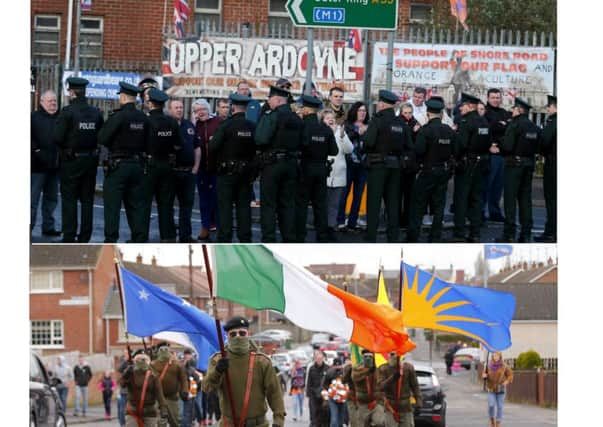John Finlay: '˜Softly, softly' approach to republican parades but not for loyalist ones


The police have a difficult and challenging job, and, as we well know, many police officers have paid with their lives while others have been maimed and scarred.
However, while the police deserve our full support, we, as a community, have a right to expect the police to carry out their duties in a fair and impartial manner. Sadly, that is not happening in relation to parades, and there is a growing discrepancy between police handling of loyalist parades on one hand and republican parades on the other.
Advertisement
Hide AdAdvertisement
Hide AdThis does not auger well for the 2016 marching season, and it must be tackled and resolved without delay.


Within the Protestant and Unionist community, we have grown accustomed to rigid police enforcement of Parades Commission determinations, with, for example, bandsmen being pursued and prosecuted for playing certain tunes.
Union Flags and other loyalist emblems have also been removed by police. On Easter Monday there was a very obvious and heavy police presence at the Apprentice Boys parade at Twaddell Avenue in north Belfast.
Contrast this with the “softly softly” approach over the Easter weekend at a series of extremely provocative and illegal republican events to mark the centenary of the Easter Rising. These were held in places such as Lurgan, Coalisland, Londonderry and Belfast, and featured paramilitary displays. Police took a very low-key approach on the ground.
Advertisement
Hide AdAdvertisement
Hide AdA photograph shows a police officer with his foot on a ladder to help a man as he erects an Irish tricolour on the wall of a pub in Belfast. On Easter Monday night, gangs of republicans attacked police in the Kilwilkie estate in Lurgan.


Police were also attacked by republicans in Londonderry. If these incidents had involved loyalists, then I suspect that more robust police action would have been taken. I echo the view of First Minister, Arlene Foster, that masked men should be behind bars, and I await with interest to see what follow-up police action is now taken.
The law must be enforced impartially, and be seen to be enforced impartially. At present, that is not happening, and there is a very clear perception that there is one law for loyalists and another for republicans.
Such overtly political policing is simply not acceptable and, if not addressed, it will further erode public confidence in the police. Those at senior levels in the PSNI have serious questions to answer, and they must answer them without prevarication or delay.
John Finlay, DUP councillor